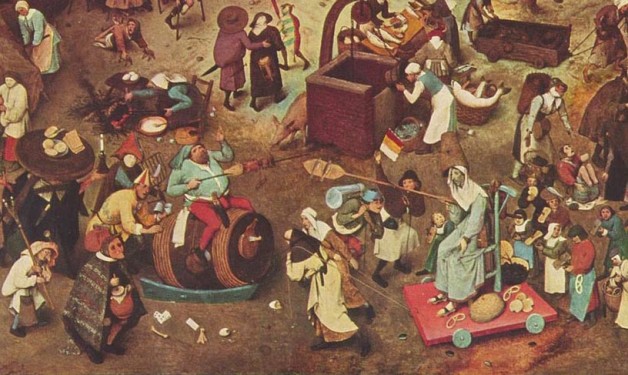Today, many Catholic countries, and some not-so-Catholic countries, are celebrating the last day before the beginning of Lent. Whether it is called Carnivale or Mardi Gras, some features are universal: lots of food and drink, lavish parties in the streets, and, interestingly, masks.
We wear masks for many reasons: the thrill of being someone or something else, freedom from social constraints, safeguarding our reputation, desiring to attract attention, or dissatisfaction with our real selves. We wear masks in order to hide, either from ourselves or others. These masks are not limited to paper-mache, but can consist of entire personalities. Mardi Gras is a good time to think about this theme, since Lent can be seen as the time of unmasking.
For the Desert Fathers, the early Christian hermits and monks who lived lives of great asceticism, the desert was the place of clear vision—a place of unmasking. It was in the silence and solitude of the desert that the soul could begin to look at itself without its habitual illusions. It was in the desert that the truth could be known. Similarly, Lent is an opportunity for learning the truth about ourselves. As the liturgical season that parallels the Israelites’ forty years of wandering in the desert and Christ’s forty days of fasting in the desert, Lent is a time of purification; and part of this purification involves learning to see ourselves as we really are, that we might get a glimpse of God.
St. Thomas Aquinas calls truth the “conformity of the intellect and the thing.” Truth is seeing what is really there, and this means removing the masks that we habitually wear. But the process of unmasking is an uncomfortable one. Unmasking means confronting what we would most like to hide: our imperfections and our sins. We don’t like facing the fact that we are not perfect. We are scared that if we see what we really are, we will have to change. Change can be a painful process, and the first glimpse of the truth is often the way it begins.
Christ assures us, however, that truth is ultimately nothing to be afraid of: “If you remain in my word, you will truly be my disciples, and you will know the truth, and the truth will set you free” (John 8:31-32). Indeed, truth is not an abstract concept, but the gaze of Christ. We come to know the truth about ourselves, about our relationship to the world, and, most of all, about our relationship to God through the words and person of Christ—through his Incarnation, Passion, Death and Resurrection. Unmasking, then, not only allows us to see ourselves more truthfully, but to see God more clearly. Our masks no longer shield us from his light; they no longer limit our vision.
When we lose our masks, we feel vulnerable, but this vulnerability turns out to be true freedom. We are like a prisoner who, when he is finally freed from his chains, finds that the lack of weight feels strange. He must become accustomed to moving freely again. Similarly, being unmasked can return us in a limited way to the freedom that humans experienced before the Fall. We are freed from the shame of self-consciousness, which caused us to put barriers between ourselves and God.
In recognizing the masks we wear, we also see that we don’t have the power to remove them completely, that there is only One who has the power to free us from the prison of our own making. We must, then, listen to his instructions. For his word “is living and active and sharper than any two-edged sword;” it “pierces as far as the division of soul and spirit, of both joints and marrow;” and it is “able to judge the thoughts and intentions of the heart” (Hebrews 4:12). Yes, the word of God can cut away our masks from our real selves. Through Scripture, the Sacraments, and the spiritual medicines of Lent—prayer, fasting, and works of mercy—Christ can do away with our illusions and, in their place, give us the spiritual freedom of the children of God. If only we cooperate with the graces offered us, Lent can be a time for shedding our masks and for feeling the light of God upon our true, uncovered faces.
✠

Image: Pieter Bruegel the Elder, Battle Between Carnival and Lent







